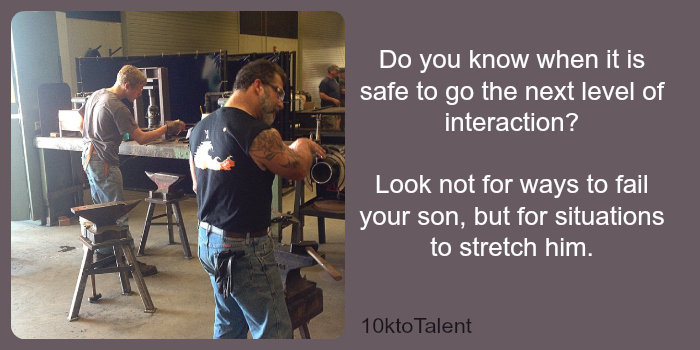How do you know when your son or daughter is ready to step up to the next level of responsibility?
How do you know when it is socially or physically safe enough?
What can you do as a parent to get them to the next level of independence?
The answer to those questions is to decide as parents that you will look for opportunities to put them in situations that are just ***slightly*** beyond the current comfort level for both the parents and the young person. The goal is not to put them in situations in order for them to “sink or swim”, but rather to put them in situations where if it does not go as well as it could, the outcome will only be mildly embarrassing or mildly painful in the flesh. After the situation is over, you can assess the outcome as a parent. You either confirm, that yes, your young person is entirely ready to handle those situations on their own OR you can be grateful that you now know the specific areas in which he needs more instruction or guidance from you. In the latter case, you give him that targeted input so that he can improve himself.
For example: you suspect, but you are not 100% sure, that your son might be ready to handle working on a small project where he has been invited to help out with other very talented and focused men. You would ideally want him to be able to do this, but you are also not sure he can handle navigating the tricky water of a such a social gathering. You don’t want him to provoke some of the rougher adult characters by having your son call them out on their rough language, like he would normally be entitled to with a sibling at home. You also don’t want him to be so over-awed by the demanding and exacting orders of the other professionals to that he wilts under pressure. In that situation, do you let or not let your young man go?
It depends. Say ‘yes’ or ‘no’ depending on the following:
YES: You let him go if you sense that should he accidentally provoke or wilt, the consequences would only go so far as a mild verbal chiding in response to his perceived cheekiness rather than a beer bottle to the head or only so far as having a bruised and blue thigh rather than a severed hand from the use of the power tools. If he only gets slightly hurt, then it is worth it. Next time he will know to be more careful.
NO: However, you should not let him go to a significantly more social or dangerous environment if he might accidentally trigger a fist fight or lose a limb due to his lack of experience. Scale him back down to something safer and let him prove himself first at that level before going to the next.
You can use that same approach when introducing your young person to social media. Start letting him interact with a small and safe circle of friends or acquaintances. Let your son or daughter interact in that zone of safety for a while. If your offspring does not get barked down by older relatives for having over-stepped his bounds and if he doesn’t rile the female acquaintances by insensitive teenage comments, then he is ready to handle a wider social circle. On the other hand, if he manages to make Suzie cry or triggers an upset phone call by an uncle, then you can have a private talk with him about how to better handle the interaction the next time around and/or make amends. Suzie and Uncle Phil will have brushed off the incident by the next day and your son will have learned a valuable lesson. It was worth the risk and now your son is operating at the next level.
In all of this decision making, your goal is not to try and fail him, but rather it is to stretch him and encourage him to go just a little further than he did before. If there is a little mishap, you are there to help him interpret how he can do it better next time. In this way you are like a coach who wants his athlete to push himself to the next level, without actually causing himself harm.

